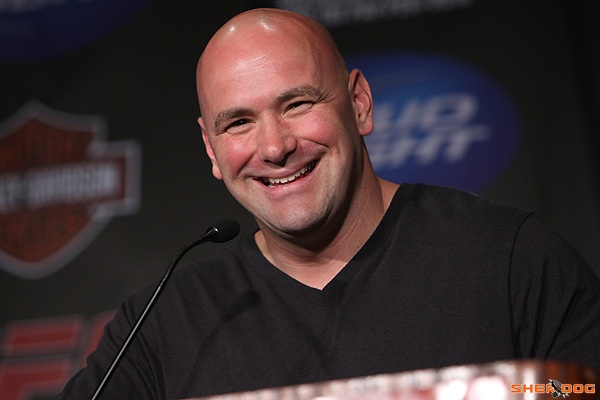On Sept. 23, 2002, Zuffa, LLC, filed to trademark the phrase “As real as it gets.” It’s a statement that rings true to what happens in the realm of professional competition inside the Ultimate Fighting Championship’s Octagon. Two athletes stand across from each other and engage in combat in one of its purest forms. Some of the time, there is no doubt who the victor is. Other times, it comes down to how three outside entities view the battle before them. Either way, though, what is transpiring inside the confines of the eight-sided enclosure is, in fact, “as real as it gets.”
The vessel that houses these displays of prize fighting, though? That’s another story entirely. Fighting is a business, and Zuffa’s business is making money, even if that is at the detriment of the company’s independent contractors.
A fighter is a commodity — there is no doubt about that — and Zuffa should not be looked down upon for having a profitable business model. However, with that notion, the company also can’t truly say that the best interests of its independent contractors are at the forefront of its mind. It’s all about dollars, even if what transpires doesn’t make the most sense.
When the news broke that there was a possibility that Jose Aldo would not be able to compete in his much-awaited and highly promoted UFC 189 title defense against the promotional enigma that is Ireland’s Conor McGregor, the UFC had a choice to make. There is no doubt in anybody’s mind that the decision-makers in the UFC who were privy to the injury information knew that Aldo would not fight. Instead of addressing this so that fans could make alternate arrangements if they chose to, the company claimed that the injuries were not as severe as they were rumored to be. Aldo would “likely” fight. The day was saved.
Some text sporting a winky face emoticon along with a picture sent via Twitter assured the world that the most anticipated UFC contest for 2015 was still going to happen. A bruised rib was all that the champion had suffered, a glass of cement and a “harden the fuck up” were all but implied by UFC President Dana White, and we had a fight on our hands.
When the actual severity of Aldo’s injuries came to light and the fight was changed, Aldo was all but left to look like the bad guy. One of the best pound-for-pound fighters in the world and the best active featherweight fighter was cast aside. What’s next for Aldo remains to be seen. One can assume that he is out of favor with the brass over at UFC headquarters, and the way that he will be treated in the future will be a good indication on where the UFC’s values truly lie.
With Aldo now basically in the crosshairs for the company, the UFC has shown its true colors once again. If this man, who should be one of the highest paid independent contractors on the roster, can be disrespected in such a way, what does that mean for the guys coming up the ranks? In reality, does anybody truly stand a chance?
The UFC knowingly deceived everybody about Aldo’s health. There may be no way to prove it, but it’s difficult to think that the company didn’t know its champion was not going to fight. It’s one thing to outright lie to the people who spend their hard-earned money to watch world-class fighting, but it’s something entirely different when the company deceives the ones who partake in the sport. That’s where the relationship between Zuffa and Reebok makes its way into the spotlight.
The UFC’s uniform policy hasn’t exactly had the best of starts. With the embarrassing Reebok launch on June 30, which included a typo at the forefront of the presentation along with the numerous incorrect fighter names on the jersey representations, it truly showed that the UFC’s interests are not on the side of the men and women whose livelihoods are in the company’s hands.
The kits, as they are being called, all look very similar. There is no personality for any fighter who is not a key money-earner. Furthermore, the prices for the products are outrageous. The Reebok deal was put into place to theoretically see the sport taken more seriously. Instead, it has turned it into a bigger joke.
While fighters may theoretically be able to pocket a handy profit from their overpriced merchandise, that would also imply that people will buy it. The idea of a uniform, if done correctly, could have seen the UFC maximize profits, but also allow its independent contractors some freedom. (That note on its own really doesn’t make sense. How an “independent” entity cannot have freedom is an argument for another day, though.) The fighter kit is supposed to offer a clean, “uniformed” look, but it would seem that the only thing that has been cleaned up are the bank accounts of the independent contractors who have collectively lost potentially hundreds of thousands of dollars worth of annual income.
The Zuffa and UFC brass may still believe in their hearts that they are looking out for their independent contractors, even if on the outside it looks like that’s far from the truth. There is absolutely no doubt that the UFC has turned the sport of mixed martial arts into a worldwide product, but the business outside of the cage? That’s the farce. It’s something that may be a reality, but it’s something that we — the fans, the media and the independent contractors — shouldn’t necessarily have to accept.
So, what say you, independent contractors with no right to your likeness and no ability to make extra sponsorship income? Do you “wanna be a fighter” or just another facet of a business that is only about making a select few a whole lot of money?
It’s your call.

